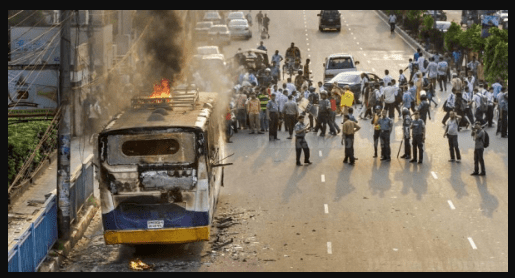
Powered by Froala Editor
Hartal should be banned in our society
Powered by Froala Editor
Renowned teacher and columnist Syed Manzoorul Islam of Dhaka University has pointed out the ineffectiveness and immoral idea of hartal to achieve any goal or political advantage in his write-up in a national daily. He said that hartal cannot be a tool of any protest and none could achieve anything by calling hartal during the last two decades. So, our political parties should decide not to call any hartal in the future. He also proposed some alternative ways to get public support and political benefit rather than calling hartal. So we think hartal should be banned.
More Information:
Introduction: Hartal, a form of protest involving the organized shutdown of businesses and public services, has been a prevalent means of expressing dissent in Bangladesh. While proponents argue that it is a powerful tool for socio-political change, others contend that its negative impacts on the economy and public life outweigh its benefits. This article aims to examine both the positive and negative consequences of banning hartal in the context of Bangladesh. Positive Impact: Economic Stability: Banning hartal could lead to increased economic stability by preventing disruptions to businesses and daily activities. The frequent imposition of hartals often results in financial losses for businesses and hampers the overall economic productivity of the country. Public Safety: Prohibiting hartal can enhance public safety by preventing the potential for violence and clashes during protests. Hartals sometimes escalate into situations where public and private properties are damaged, leading to security concerns. Social Harmony: Banning hartal may contribute to social harmony by reducing the polarization that often accompanies these protests. Continuous disruptions and confrontations can strain community relationships and hinder social cohesion. Negative Impact: Suppression of Dissent: Banning hartal might be perceived as an infringement on the right to freedom of expression and assembly. Critics argue that such a ban could stifle dissent and limit citizens' ability to voice their grievances through non-violent means. Political Expression: Hartals have historically served as a platform for citizens to express their dissatisfaction with government policies. A ban on hartal may limit the avenues through which citizens can peacefully communicate their concerns and engage in political discourse. Impact on Opposition Parties: Banning hartal may disproportionately affect opposition parties, limiting their ability to mobilize public support and express dissent against the ruling government. This could potentially create an imbalance in the political landscape. Conclusion: The debate surrounding the banning of hartal in Bangladesh is complex, involving considerations of economic stability, public safety, social harmony, and political expression. Striking a balance between maintaining order and upholding democratic principles is essential. Policymakers must carefully evaluate the potential consequences before deciding whether to ban hartal or explore alternative methods of protest that protect public welfare without compromising fundamental rights.
Powered by Froala Editor